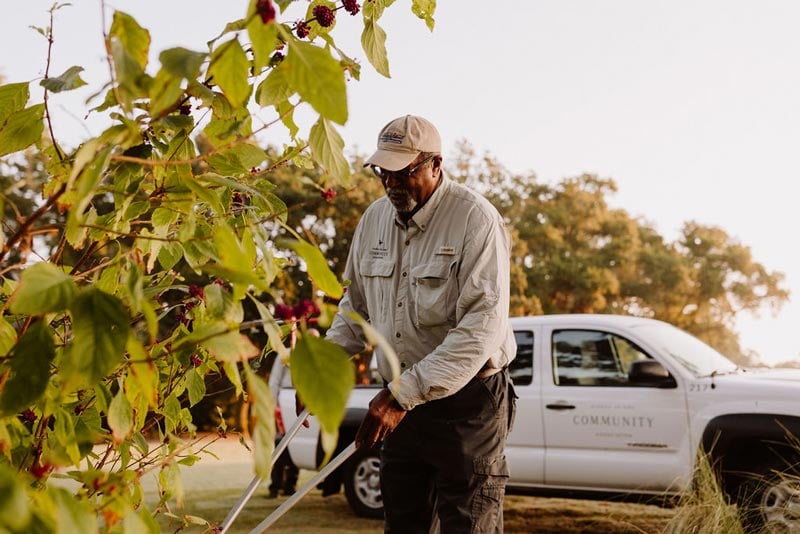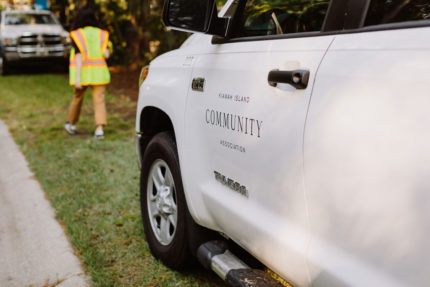Feb
17
2017
From The Blog
Looking Back, Forging Ahead: New Security Director Tony Elder Settling Into His Role on Kiawah
Tony Elder has been KICA Director of Security for barely nine months, but already he has weathered a tropical storm and related flooding; managed a direct hit from a hurricane, the worst storm to affect Kiawah in 27 years; impressed KICA members with his openness and responsiveness; and begun to put his stamp on the community with a variety of security enhancements.
Tony came to Kiawah with 31 years’ experience in law enforcement, seeking a more family-oriented lifestyle than his management role with the Charleston Police Department(CPD) afforded him. From high school dropout to a master’s degree in Criminal Justice, from patrolling the Virginia Beach beachfront on bike to Deputy Chief of the CPD, and now as KICA security director, Tony’s upward climb in the world of police work has been steady and remarkable.
After dropping out of high school in 10th grade, Tony earned his GED and then entered the military at age 17. He spent four years in the Navy and later served seven more in the Army reserves.
“I dropped out because my parents and older sister had done the same and no one had any expectation of me finishing high school. I missed so much of 10th grade that I would have had to repeat it, so I went to work in construction. But the military changed my life,” he says. His years in the service taught him discipline, the need for structure in one’s life, and the importance of having goals and objectives
After his Navy career, Tony followed his uncle into the Virginia Beach police force, where he met his current wife of 25 years. “She had a two-year college degree and we did some classes together, and I just kept going,” he says. He earned his bachelor’s degree in criminal justice with honors, then a master’s in criminal justice. He has never left the world of education behind, beginning work on a doctorate in business with a concentration in criminal justice, graduating from a senior management institute for police, and teaching online criminal justice courses at several institutions. “I need to teach online rather than in person because it’s challenging to commit to a certain day and time. I have to be available at all times should emergencies arise. Online teaching fits better with my job responsibilities because I can teach when I am available,” he explains.
Police work suited Tony from the beginning, and through a series of promotions he moved steadily up the ranks. “I liked the excitement of the work and I was willing to do risky jobs,” he says. A particular attraction of the law enforcement profession is that throughout his career, Tony has been able to “switch around and try many different types of jobs. My niche became special investigations,” he says. Early in his law enforcement career, Tony patrolled the beachfront in Virginia Beach on bike, responding quickly in places patrol cars could not go. “It was fun. I got paid to ride a bike,” he grins. He then moved into narcotics work, which he describes as, “the best part of my career. I was making a huge difference in the community, and I liked the work.”
Charleston Police Chief Mullen, who also came to Charleston from Virginia Beach, was one of Tony’s training officers. Tony worked for him in narcotics, intelligence, and special investigations, and eventually became his executive assistant. Twenty-two years after Tony joined the Virginia Beach police force, Chief Mullen recruited him to Charleston. “I asked him what I would be doing, and Chief Mullen replied, ‘Does it matter?’ I said, ‘no.’”
Chief Mullen shepherded Tony into the management arena, which Tony describes as another “life changing decision.” He elaborates, “I learned more about servant leadership, that you are there to serve others – the people you lead, the organization, the community. Chief Mullen stressed that the Charleston police department is not there to give you a job; it’s there for you to provide a service. Treat others as you would want to be treated and would want your family treated. He gave me a phenomenal example of great leadership.”
Police work has its downside. “There is so much sadness,” Tony laments, describing several gruesome cases. However, he calls the Emanuel AME Church mass shooting in June 2015 as “the most horrific tragedy I was ever involved in. I can’t imagine that level of evil.” After the church shooting, he began to think more about a calmer life with more time for his family. “The things that make police work challenging – diverse community concerns, and the prevention and investigation of homicides, rapes and traffic fatalities – are also stressful,” he notes. “That affects the quality of family time, and I live for my kids.” He regretted when he could not commit to time with his children, now 11 and 32. And so he has come to direct security for KICA, where he has more predictable hours, fewer incidents that require a the director’s intervention, a low crime rate, the support of the county sheriff’s office for serious problems, and 32 rather than 360 reportees. “My family is more happy than they have been in a long time, and I am excited about coming to work every day,” he remarks.
Until he somewhat inelegantly herniated his back, Tony did karate with his wife and son; injured, he watched them earn their black belts. His wife retired from the police force when their son was young so she could home school him, and when they wanted him to be able to do archery, which was unavailable or home-schooled students, he and his wife became certified archery instructors and started a team, which now numbers about 30 home-schooled children and advanced to the regional and state championships in its first full year last year. He has also introduced archery to children attending summer camps for students in underprivileged communities.
From his first month on the job, Tony sought to improve both KICA security and security operations among the Kiawah entities (KICA, the resort, the town and the developer). A skilled communicator who promotes collaboration and earned praise for his work with the people most affected by the church shooting, he began in Kiawah by asking people, “what can I do for you?” “No one, including [resort president] Roger Warren, asked for anything,” he says. “I have taken over a team that is already doing a wonderful job, and mostly, I just need to tweak things.”
In his first few weeks, Tony targeted technology upgrades to improve security operations. He was involved in implementing all the technology projects the city of Charleston put in place during his eight years with the CPD, including placing cameras in cars and on officers and deploying automatic license plate readers throughout the city. He has already begun implementing some technological improvements for KICA.
One of Tony’s first moves was to post a to-do list on a white board in his office and encourage staff to add to it. Some of the initial list items have already been budgeted. In his first month, he presciently listed storm management, not just for hurricanes but looking at options for traffic management during heavy rains and flood tides, as a high priority. His early list also included bike safety, including examining how other resorts handle it, traffic speed, a re-alignment of management within the security department, and changing staff uniforms, which he described as an easy fix: “No one likes them, they are easy to change because we have a contract with a company that has other uniforms, and small things like that can make people a lot happier.”
One of Tony’s current goals is a review of the gate pass process and budgeting for a change in technology to enhance it. He likes the bar code system for property owners but wants a better entry
management process for employees, contractors and visitors, none of whom have bar codes. “I have been looking at this for eight months already,” he says. Another is a personnel change. He is in the process of hiring an assistant director and is seeking someone with an extensive emergency management background who can share in the management of Kiawah’s mitigation, response and recovery to any emergency situation, including major weather events.
Tony stresses the importance of working with the other island entities as well as Freshfields and the St. Johns Fire Department in emergency situations. “During Hurricane Matthew, I got a chance to look at how we operate and realized there are significant opportunities for us to enhance our capabilities,” he says. He would like to see a “unified command structure” with representatives of all the organizations for making decisions or managing communications, and he says KICA will contribute more effectively to the joint effort with an additional emergency management expert of staff (Tony also has this expertise).
Tony practices an open door policy and encourages you to come to him with questions, concerns, ideas or just to chat. Maybe think twice, though, about coming with something to hide. Tony says his children would say that it can be unsettling growing up with someone whose job it is to get people to confess.
Article contributed by Digest Feature Reporter Sue Schaffer.

